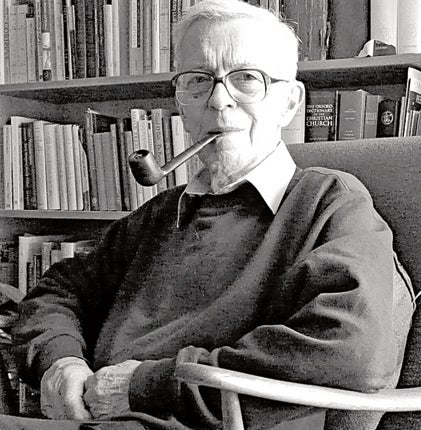Robert Markus: Medieval historian noted for his writings on the early Church

Robert Markus was a distinguished medieval and ecclesiastical historian known principally for his writings on St Augustine and the history of the early Church. While he wrote as a committed Christian, he always insisted that ecclesiastical history must be written with the same scientific objectivity as secular history, and that ecclesiastical developments could only be understood in relation to wider changes in society.
Robert Austin Markus was born in 1924 in Budapest. His father was director of a heavy-engineering firm, his mother was an internationally recognised ceramicist. As an artist, she was drawn to Christian themes, and according to Markus's brother Tom, she was Catholic in spirit from an early age. The family's origins were Jewish. Markus's father converted to Lutheranism as a young man, but amid growing anti-Semitism decided that this was no time for a Jew to leave his community, and so had himself readmitted to the synagogue.
The family came to England in 1939; Markus's father and uncle were able to establish an engineering works near Glossop in Derbyshire which produced machine tools for Spitfires. Markus spent two happy years as a boarder at Kingsmoor, which he described as "a Quaker-type school", and the next eight years at Manchester University.
Markus's first degree was in chemistry, and he spent some time as a works chemist in a margarine factory. He then took an MA and a PhD in philosophy, under the supervision of the distinguished philosopher Dorothy Emmet, who was a huge influence on him.
At Manchester he was one of a close circle of friends united by radical social ideals, and an interest in Catholicism; the group included a history student called Margaret Bullen. Other friends were Walter Stein, who introduced Markus to radical politics and nuclear disarmament; John Herbert McCabe, a proponent of liberal Catholicism; and Fr Vincent Whelan, who introduced him to the writings of St Augustine.
In 1946 Markus converted to Catholicism, perhaps to harmonise the tensions produced by his inner personal life, his immigrant background and socialist politics. He entered the novitiate of the Dominican order, but before taking his final vows he was visited by Margaret Bullen and he decided that his future lay instead in marrying her, which he did in 1955.
From 1955 to 1974 Markus was at Liverpool University, first as a librarian, and then lecturer, and finally reader in the department of medieval history. Here he first revealed his great gifts as a teacher. Always benevolent, he did not impose knowledge, but helped pupils to work out problems for themselves.
Markus established an international reputation as a historian of the early Church. In 1974 he was appointed to the chair of medieval history at Nottingham. It was largely thanks to him that the Nottingham classics department survived at a time of financial stringency. In 1985, when it seemed that the university would be forced to make redundancies, he took voluntary early retirement. This proved extremely productive.
In 1990 he published what is probably his masterpiece, The End of Ancient Christianity, and in 1997 Gregory the Great and his World. Together the two books provide an original and readable account of the transformation of the Church in response to radical changes in the surrounding society and culture. At the time of his death he was re-reading the works of Gregory, and revising his book.
Markus spent a year at the Princeton Institute of Advanced Studies, and held a number of visiting professorships in the US. From 1991-95 he was president of the International Association of Patristic Studies. He was elected a fellow of the British Academy in 1984, and received the OBE in 2000.
Markus was very much concerned with the problem of the place of Christianity, and particularly of the Catholic community, in relation to a society which was no longer Christian but multicultural. He felt that the Church, while remaining itself, must be open to society, share its concerns, and be ready to discuss them. His historical studies cover a period of transformation, in the opposite direction to that which was happening in his lifetime. In the age of Augustine, Christians lived in a world in which the pagan culture of the classical world, with its rich variety of traditions, was still fully alive. Augustine engaged in dialogue with a culture which was largely pre-Christian. Roughly 200 years later, Pope Gregory the Great could assume that everybody who mattered was Christian. The Church now inhabited a culture to a large and ever growing extent of its own making. When he read Augustine, Robert Markus might be said to have gone in search of Christian traditions which did not try to shape, or at least could not hope to shape, surrounding society, and which had a legitimate place for the autonomy of the secular.
Wolf Liebeschuetz
Robert Austin Markus, historian: born Budapest 8 October 1924; married 1955 Margaret Catherine Bullen (two sons, one daughter); Liverpool University, sub-librarian, 1955-59, lecturer, senior lecturer, then reader in medieval history, 1959-74; professor of medieval history, Nottingham University, 1974-82 (Emeritus); died Nottingham 8 December 2010.
Join our commenting forum
Join thought-provoking conversations, follow other Independent readers and see their replies
Comments
Bookmark popover
Removed from bookmarks